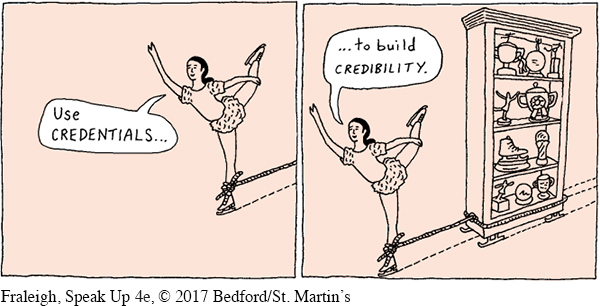Establish Your Credibility
Your audience members now know what they’ll get out of listening to your speech. Next, you need to answer the question, “Why should we listen to you? What makes you a credible source on this topic?”
How do you build credibility? You do it the same way that your sources of evidence do—
Page 291

To establish credibility, explain how you have gained knowledge about your topic. In one or two sentences, emphasize your most relevant credentials (resist the urge to recite your entire résumé or life history!), making sure to adopt a modest, nonsuperior tone.
A student speaker named Alexandra established her credibility in an informative speech about judging competitive ice skating by emphasizing her own relevant experience. Alexandra was especially qualified to speak on the subject because she won nearly one hundred awards during her skating career and also served as a judge at several prestigious skating events in her home state. She could have chosen to discuss her many accomplishments in the sport, but she chose to establish her credibility in this clear, concise, and unpretentious way:
I have been active in the sport of ice skating since I was six years old and have won my fair share of events. I still love skating, so after retiring from competition, I became certified as a judge and have judged at many competitions during the past two years.
With this information, Alexandra left no doubt in her listeners’ minds that she was a good source of information on ice skating. She also held their interest by summarizing her experience without providing excessive detail about specific awards or competitions, which would have meant little to them.